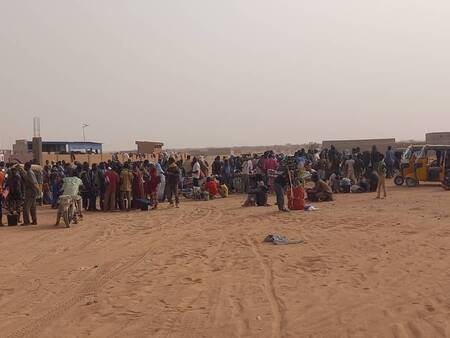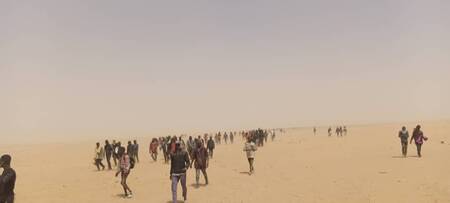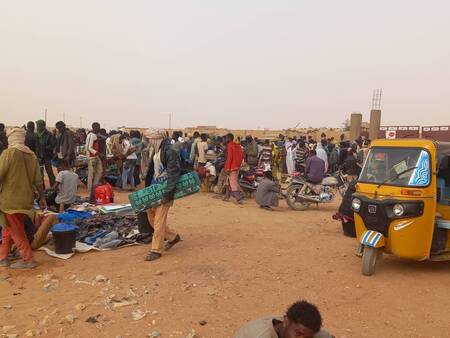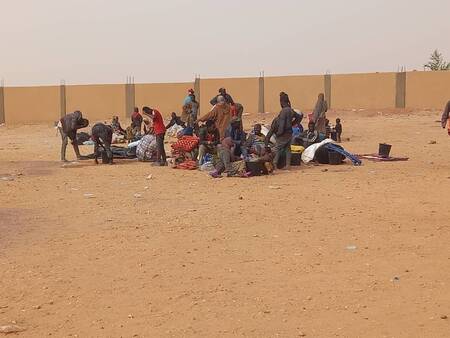On 20th and 22nd of March 2022, at least 1693 people were deported from Algeria to Niger. The number of people deported since the beginning of 2022 is now at least 5069. At the same time, Alarme Phone Sahara teams report an increasingly precarious situation in Assamaka and in the northern cities of Niger for thousands of deportees who are not or not sufficiently taken care of in IOM camps.

Deported citizens of Niger arrive in Agadez, 10th of March 2022
©Alarme Phone Sahara
Unofficial deportation convoy of 20th of March 2022
On 20th of March 2022, 582 deportees in an unofficial deportation convoy, among them 5 women, 2 underage girls and 575 men, arrived in Assamaka at the Algerian-Nigerian border on foot, after Algerian forces had dropped them off at Point Zero 15km from Assamaka. Also this time, the largest groups of deportees were 250 citizens of Mali and 195 of Guinea Conakry. Among them were 6 citizens of Sudan, 18 from Burkina Faso, 29 from Ivory Coast, 13 from Sierra Leone, 10 from Cameroon, 9 from Benin, 26 from Gambia, 12 from Nigeria, 2 from Niger itself, 3 from Egypt, one from Liberia, one from Guinea Bissau, one from Libya, one from Somalia and one from the Komoros.
Official deportation convoy of 22 March 2022
According to the whistleblowers of Alarme Phone Sahara in Assamaka, an official deportation convoy with 1111 Niger citizens, including 45 women, 42 minor girls, 32 minor boys and 992 men, arrived on 22nd of March 2022.
Precarious conditions for thousands of deportees in Niger
In Assamaka

Arrival of deportees at Assamaka on foot, 8th of March 2022
Alarme Phone Sahara whistleblowers, as well as deportees who share their testimonies, report that conditions in the IOM camp in Assamaka are poor and deteriorating. People complain about lack of food and medical care and unhygienic conditions. According to these testimonies, there are people who have gone without food for days. Some say that they have been deprived of their freedom of movement by not being allowed to leave the camp, which may be a consequence of the problematic application of containment regulations due to the Covid pandemic.
In addition, Alarme Phone Sahara whistleblowers have reported that the truck used by IOM to rescue people in need between Point Zero and Assamaka is currently broken down, so that shuttles by IOM, humanitarian organisations present in Assamaka and the security forces are currently suspended. This situation aggravates the danger to the lives of the deportees, as there are often sick, injured and weakened people who are no longer able to walk 15 to 20 km from Point Zero to Assamaka and others who get lost in the desert and cannot find their way back.
In Agadez


Deported citizens of Niger arrive in Agadez, 10th of March 2022
©Alarme Phone Sahara
According to the Alarme Phone Sahara teams, the situation is also worsening in other towns in Niger, such as Arlit and Agadez, where there are thousands of deported people who can neither resume their journey nor return to their areas and countries of origin. Usually, the deported people arrive empty-handed, as Algerian security forces snatch their money, mobile phones and personal belongings. IOM and other organisations on the ground say that they are overwhelmed by the large number of deportees arriving in Niger and that on the other hand, the return of non-Nigerians to their countries of origin is lagging behind due to a lack of cooperation from the national authorities of these countries.
According to the Alarme Phone Sahara team in Agadez, there are now often deported migrants who, in their misery, sell mats and other items they have received from IOM, because they lack other sources of income.
At the same time, there are others who avoid staying in the IOM camps, because their help is always linked to the condition of submitting to their so-called voluntary return programmes.
On the other hand, for deportes of Nigerien nationality, who often come from the most impoverished regions of the country, such as the Kantché region, the problem arises that since 2020, the state of Niger no longer supports its own citizens deported from Algeria to return to their respective communities of origin.
In Dirkou
Even in Dirkou, in the desert in the north of Niger, more and more people have been deported from Libya recently. According to existing agreements, the Libyan authorities are obliged to transport deportees to the city of Agadez. For these deportation convoys, they commission private transport contractors. The latter often only take the deportees as far as the stopover in Dirkou and try to negotiate with other drivers to take them to Agadez. In practice, this does not always work reliably, so that more and more people get stuck in Dirkou.
Discrimination in misery
According to the observation of the Alarme Phone Sahara teams, shared also by researchers in the context of migration, in addition to this general misery, there are practices of discrimination in the management of the care of the deported persons. One phenomenon observed is the discrimination of people from English-speaking countries against those from French-speaking countries.
Women and girls targeted by criminal networks
The precarious situation of deportees in Niger also creates conditions of vulnerability especially for women and girls, some of whom are targeted by criminal networks of human trafficking and forced prostitution, which often operate transnationally between Libya, Niger, Nigeria, Mali and sometimes as far as Europe. The Alarme Phone Sahara team in Agadez followed the case of a group of girls of Nigerian origin who were forced into prostitution by a woman who was part of a criminal network in both Libya and Niger. With the help of a pastor, they managed to escape to find protection inside a church and the perpetrator was arrested by the Nigerien police.
In light of this situation, Alarme Phone Sahara demands:
⦁ Deportations from Algeria, Libya and other countries must be stopped.
⦁ The deportation agreement between Algeria and Niger, and all deportation agreements, must be cancelled.
⦁ IOM must use its resources to support deportees who reallly wish to return to their countries of origin.
⦁ Support for migrants in distress must be guaranteed unconditionally and must not depend on accepting so-called "voluntary return".
⦁ The IOM must ensure that those received in its centres are provided with decent living conditions, including food supply, medical care, hygiene and accommodation.
⦁ The state of Niger must continue to support its citizens who are deported from Algeria and other countries to return to their regions and communities of origin instead of abandoning them in conditions of distress.
⦁ Countries in the sub-region should support their citizens who really wish to return without complication.
⦁ Stop the policies of outsourcing European borders on African soil!
Call for solidarity and independent support for migrants in Niger
Due to the numerous mass deportations from Algeria, and more recently from Libya, thousands and more and more people are stranded in Niger's cities, empty-handed, without sources of income and without access, or sufficient access, to official support structures. Some of them approach voluntary structures, such as Alarme Phone Sahara, which do not have sufficiant resources to meet the needs in this misery.
Alarme Phone Sahara calls for support for its work and that of other independent civil society organisations that provide practical solidarity to migrants in Niger. Alarme Phone Sahara organises a weekly collective kitchen in Agadez, provides a reception point for deportees in Assamaka, organises patrols to rescue people in distress in the Kaouar region and Assamaka, and provides other forms of daily support.

